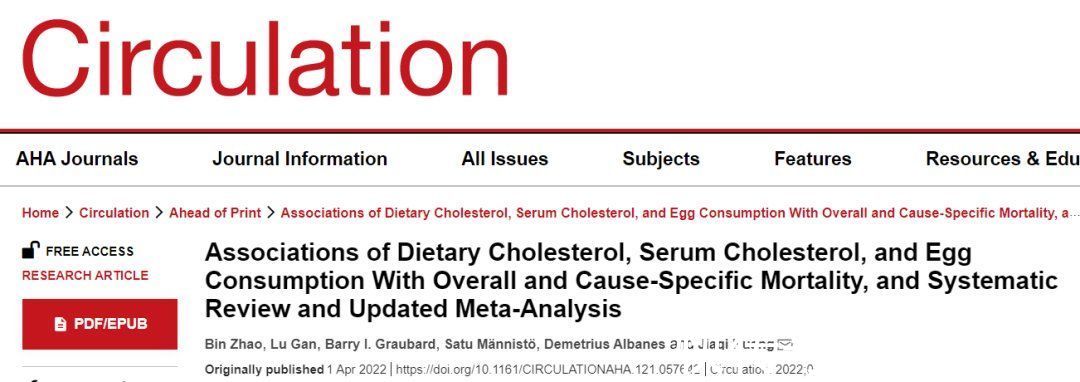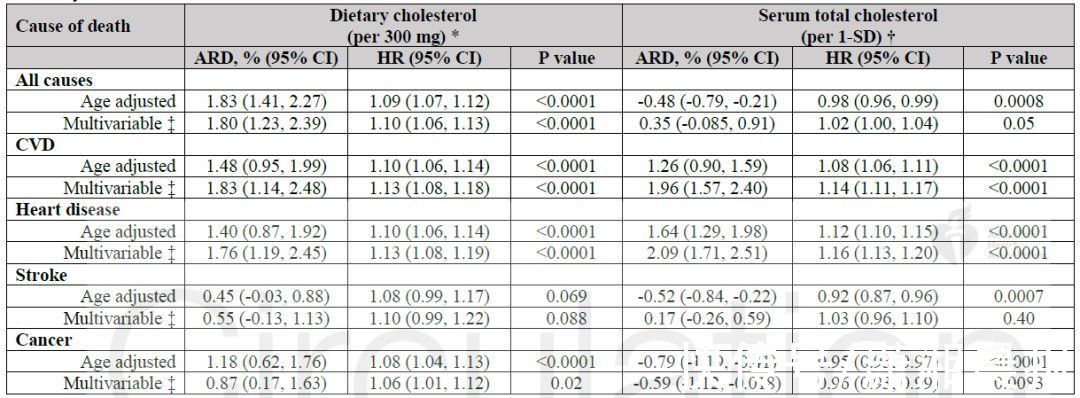Recently, the team of Professor Huang Jiaqi and Professor Zhao Bin from the National Clinical Research Center for Metabolic Diseases, the Key Laboratory of Diabetes Immunology of the Ministry of Education, the Department of Metabolic Endocrinology, the Second Xiangya Hospital of Central South University, and the team of Professor Bin Zhao published in the international journal “Circulation” (instant IF=36.891) Published an original research paper entitled “Associations of Dietary Cholesterol, Serum Cholesterol, and Egg Consumption With Overall and Cause-Specific Mortality, and Systematic Review and Updated Meta-Analysis”. The Second Xiangya Hospital of Central South University is the first author unit and the first correspondence unit of the paper. Professor Zhao Bin is the independent first author of the paper, and Professor Huang Jiaqi is the corresponding author.

High dietary cholesterol and increased egg intake were associated with an increased risk of all-cause and CVD mortality, the study found. Our findings support that dietary cholesterol restriction contributes to long-term cardiovascular health and longevity, and provide big-data evidence for dietary guideline development.
Despite considerable attention highlighting the importance of exogenous dietary and endogenous serum cholesterol to human health, a thorough, comprehensive analysis of their relationship to long-term health outcomes has not been possible. Comprehensive inspection. Dietary cholesterol is consumed in foods including eggs, beef, fish and pork, while endogenous serum cholesterol is synthesized in the liver and extrahepatic tissues and circulates in the blood. Cholesterol plays an important role in cell membrane structure and signal transduction, and participates in basic regulatory functions, including nutrient absorption, glucose metabolism, reproductive biology, and stress-related responses.
In addition, laboratory evidence suggests that cholesterol has cytotoxic activity; that is, cellular cholesterol accumulation induces cell membrane rupture, apoptosis, inflammation, and other stress-related responses. Earlier experimental and observational studies have highlighted the importance of cholesterol homeostasis for proper cellular and physiological function, supporting that impaired cholesterol metabolism may be involved in the development of chronic diseases including cardiovascular disease (CVD) and cancer hypothesis of.

Associations between dietary cholesterol, serum total cholesterol, and overall and cause-specific mortality in the ATBC study (figure from < em>Circulation)
Therefore, long-term dietary guidelines recommend limiting dietary cholesterol to 300 mg per day to improve cardiovascular health. However, a 2015 Scientific Report from the Advisory Committee on Dietary Guidelines states that (1) “cholesterol intake need not be limited because there is only a weak relationship between cholesterol intake and serum dietary cholesterol while consuming a healthy dietary pattern”, and (3) “Egg consumption should be considered part of a healthy diet”.
Eggs, a very common and affordable food, are one of the main sources of dietary cholesterol, a large boiled egg contains 186 mg of cholesterol, and eggs also contain a variety of high-quality Nutrients, including protein, fatty acids, vitamins and minerals. The 2020 Dietary Guidelines Advisory Committee updated scientific report mentions 1) “recommendations to reduce intake of high-cholesterol foods appear to be prudent,” and 2) “the lack of studies evaluating some of the results highlights the need for further research. Necessity (on dietary cholesterol)”.
For more than two decades, epidemiological studies have assessed the association between higher dietary cholesterol and egg intake and disease risk, with conflicting results. Some studies have shown an increased risk of cardiovascular disease and mortality, while others have shown zero, or inverse, associations between cardiovascular disease and mortality. However, reported risk estimates and directionality vary widely, depending in part on study design, number of events, source population, consumption levels, confounding controls, and duration of follow-up, making correlations unclear.

Association between daily egg intake and overall and cause-specific mortality in the ATBC study (figure from < em>Circulation )
To provide evidence for a more comprehensive assessment in relation to dietary guidelines and healthy eating patterns, the study examined alpha-tocopherol, beta-carotene cancers in 27,000 participants Associations between dietary cholesterol, serum cholesterol and egg intake and overall and cause-specific mortality were examined in the Prevention (ATBC) study,27,000 participants were followed for over 30 years . Based on the findings, an updated meta-analysis was conducted on the association between egg intake and cardiovascular disease risk and cardiovascular disease mortality. Based on 482,316 person-years of follow-up, the study identified 22,035 deaths, including 9,110 from cardiovascular disease (CVD).
Higher dietary cholesterol and egg intake were associated with increased overall and cardiovascular mortality. For each 300 mg daily increase in cholesterol intake, the HRs for overall and CVD mortality (respectively) were 1.10 and 1.13, and for each 50 g daily increase in eggs, the HRs for overall and CVD mortality were 1.06 and 1.09, respectively (A higher serum total cholesterol concentration for all P values was associated with an increased risk of death from CVD (HR per 1-SD increment: 1.14; P values
based on 49 risk estimates, 3,601,401 participants and 255,479 An updated meta-analysis of cohort studies of events showed that an additional 50 g egg daily intake was associated with a significantly increased risk of CVD. In a subgroup analysis of geographic regions, in the US cohort, 50 g daily intake Eggs were associated with higher CVD risk (pooled RR=1.08, 95% CI: 1.02, 1.14) and appeared to be associated with higher CVD risk in the European cohort with borderline significance (pooled RR=1.05), but not in the Asian cohort were not associated with CVD risk.
In conclusion, in this prospective cohortHigher dietary cholesterol and egg intake were associated with increased risk of overall and CVD mortality in studies and updated meta-analyses. The findings support dietary cholesterol restriction as a means of improving long-term health and longevity.
Xiaoxiang Morning News reporter Xia Sheng correspondent Sha Lina
News clue breaking news channel: Download the “Morning Video” client from the app market and enter the “Morning Help” topic; Or call the morning video news hotline 0731-85571188.